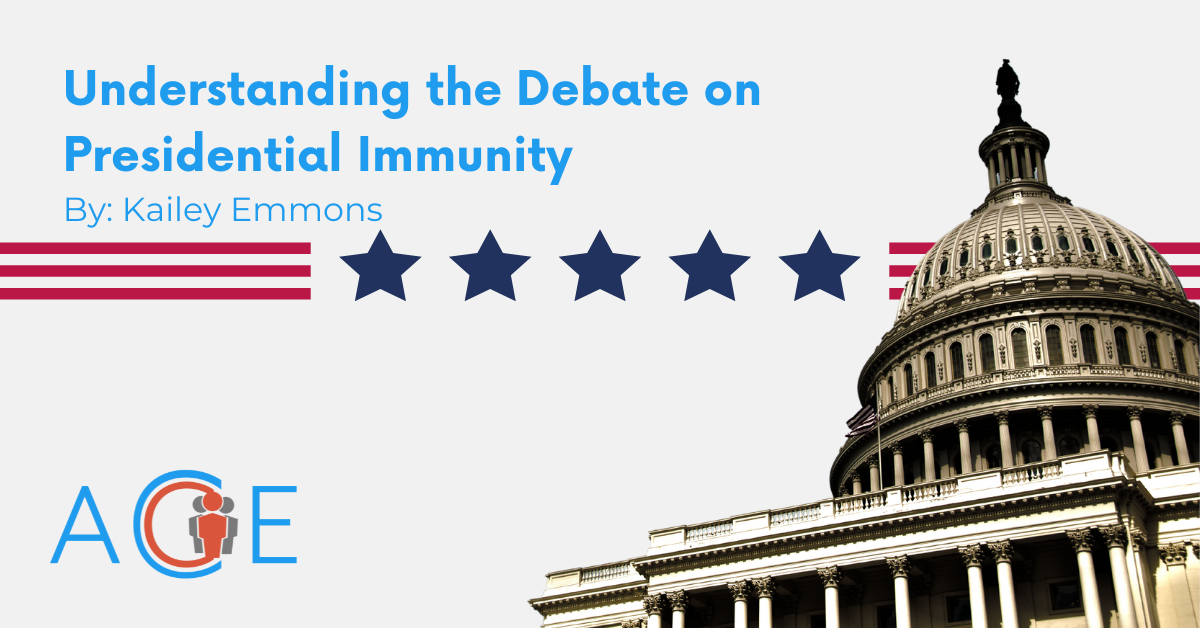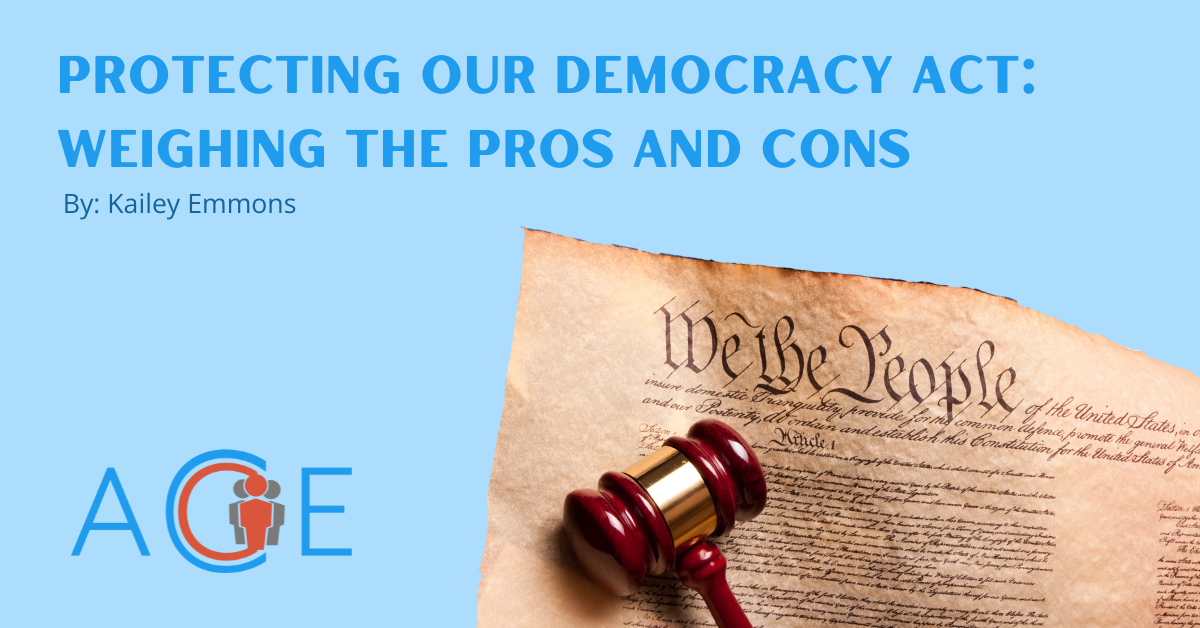Presidential Immunity: History and Background
Presidential immunity is the long-standing idea that the president of the United States has exemption from liability or legal proceedings for acts related to the duties of presidential office. Contrary to popular belief, presidential immunity is not explicitly enumerated in the Constitution; only sitting members of Congress are explicitly granted judicial immunity through the Constitution’s Speech or Debate Clause. Rather, the concept of presidential immunity has arisen through the Department of Justice’s longstanding policy against prosecuting presidents in office and the Supreme Court’s interpretation of Article II, which has developed through a number of Supreme Court cases dating back to 1867.
These cases are as follows:
- Mississippi v. Johnson (1867): When Congress passed the controversial Reconstruction Acts of 1867, the state of Mississippi attempted to block their implementation by asking the Supreme Court for an injunction against President Andrew Johnson to prevent him from enforcing the Acts. The Supreme Court held that they had no right to prevent a president from acting in their official capacity, setting the stage for future immunity rulings.
- Nixon v. Fitzgerald (1982): Arthur Fitzgerald was an Air Force employee who testified before Congress about the Air Force’s cost overruns and technical difficulties. When he was later fired during a departmental reorganization under Richard Nixon’s presidency, Fitzgerald sued Nixon on the grounds that his firing was retaliation for his testimony. The Supreme Court held that the president has absolute immunity from civil liability arising from any official action taken while in office, officially creating the privilege of civil presidential immunity.
- Clinton v. Jones (1997): Paula Jones alleged that Bill Clinton had sexually harassed her while he was Governor of Arkansas. The federal judge assigned the trial delayed it until Clinton was out of office under the belief that sitting presidents are immune from all civil suits. However, the Supreme Court held that the Sixth Amendment requires a civil lawsuit against a current president to proceed if it is unrelated to behavior that occurred during time in office. This is because executive immunity does not apply to actions committed outside of executive office.
- Trump v. United States (2024): When indicted for his connections to the January 6, 2021 attack on the U.S. Capitol and his attempt to overturn the 2020 presidential election, former President Donald Trump claimed that he could not be prosecuted for his acts unless he had been impeached by the House of Representatives and convicted by the Senate. The Supreme Court held that former presidents can never be prosecuted for actions relating to the core powers of their office and that they are presumptively immune from criminal liability, in addition to civil liability, for their official acts. However, they also held that presidents have no immunity for unofficial acts and preserved the possibility of prosecuting presidents for some acts within their formal responsibilities.
There are two important distinctions to make in examining these cases and their holdings. The first is between a civil suit and a criminal prosecution. Historically, presidential immunity has only been extended to civil suits. However, Trump’s recent Supreme Court case has now sparked a debate over the potential validity of criminal immunity. The second distinction is between an official and an unofficial, or private, act. An official act is an action taken within the scope of the president’s powers as outlined by Article II of the Constitution. All other actions undertaken by a president, even those which occurred during their term, are considered private acts. Much of the controversy around Trump’s claims of immunity arises from uncertainty as to whether his actions should be considered official or private.
Arguments in Favor of Presidential Immunity
One argument in favor of presidential immunity is that it prevents retaliatory and politically biased prosecutions against presidents. Without established immunity, politically biased prosecutors could unfairly target presidents for arbitrary reasons once they leave office. For example, most U.S. presidents are accused of insufficiently enforcing a federal law at least once during their term. Most of the time, these accusations go nowhere. However, without the privilege of presidential immunity, these accusations could turn into prosecutions by their political opponents.
This contributes to another popular argument in favor of immunity — that it protects the ability of the executive branch to function effectively. Proponents argue that presidential immunity allows presidents to freely make decisions based on the public interest, rather than choosing a less optimal but “safer” option to avoid future prosecution. This protects the independence of the executive branch by giving the president free reign to exercise their powers and perform their duties without fear of the courts. Supporters of presidential immunity claim that it maintains the separation of powers between the three branches of government, allowing the president to act without excessive oversight from other branches or parties.
Arguments Against Presidential Immunity
Critics of presidential immunity, especially as defined in Trump v. United States, claim that it compromises presidential accountability. They state that it translates to an absence of legal consequences for the executive, and thus eliminates deterrents to breaking the law. President Joe Biden, a prominent critic of expanded presidential immunity, points to Trump’s alleged incitement of the January 6 attack as an example of something future presidents could do without legal consequences. Opponents also believe that expanded immunity empowers presidents to operate without oversight and increases the risk of corruption and abuse by shielding presidents from legal scrutiny.
Opponents further argue that expanded presidential immunity weakens the American system of checks and balances. They claim that it eliminates a key check on executive power. Critics say that executive power has already grown out of proportion in relation to the other two branches, as seen in the increased use of executive orders in recent presidencies. They believe that expanded immunity only worsens that imbalance by diminishing the judicial branch’s ability to hold the executive branch accountable.
Finally, critics of expanded immunity believe that it threatens democratic rule of law by placing the president above the laws that all citizens must obey. Under presidential immunity, they argue, the law is not equally applied to all. Some fear that this open exemption for the executive will cause citizens to lose faith in their ability to hold elected officials accountable, weakening collective faith in the democratic process. Opponents also believe that expanded immunity has already allowed Trump to get away with anti-democratic behavior, such as attempting to overturn the 2020 election. They claim that protecting actions such as these is a threat to American democracy.
Conclusion
In summary, the state of presidential immunity has changed over time due to various Supreme Court holdings. Those in favor of presidential immunity argue that it prevents retaliatory prosecutions and protects the ability of the executive branch to function. Those in opposition to the recent definition of presidential immunity argue that it compromises executive accountability, weakens checks and balances, and threatens the democratic rule of law.
Given the Trump v. United States decision and Donald Trump’s recent reelection, the debate around presidential immunity is more relevant than ever. Due to his election as president, the cases against Trump will likely end, and it is improbable that we will see how far presidential immunity extends under the court’s 2024 decision. Trump’s election brings a new concern for critics, who believe that Trump may be more willing to stretch the law than he was during his first term due to the expanded immunity now afforded to presidents.
However, expanded presidential immunity is not necessarily permanent. President Biden recently proposed a No President is Above the Law amendment, which would eliminate immunity for crimes a former president committed while in office. This is unlikely to pass in the next few years due to a Republican-majority Congress, but it does raise questions about the future of criminal immunity for presidents in administrations to come.


